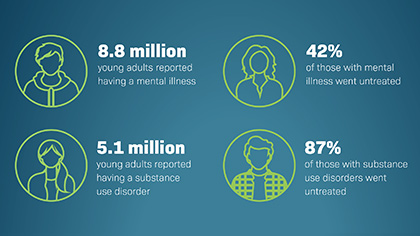
The transition from adolescence to adulthood is a time of enormous change, freedom, and self-discovery. Yet for many in the 18-to-21-year-old age group, this crucial life stage is also when mental health issues and addictive behaviors begin to surface. Across college campuses, workplaces, and homes, young adults are experiencing anxiety, depression, trauma, and substance use at alarming rates. These challenges are not isolated problems; they are deeply interconnected threads of a broader public-health crisis that affects academic success, relationships, and the very foundation of emotional development.
A Defining Period of Vulnerability
Mental health issues in young adults often emerge just as individuals are stepping into independence. This age group faces the first major pressures of adult life—balancing school, work, social identity, and personal responsibility. The brain continues to develop well into the mid-20s, particularly the prefrontal cortex, which governs impulse control, emotional regulation, and decision-making. When combined with new social freedoms and reduced parental oversight, this neurodevelopmental stage can leave young adults especially susceptible to both mental illness and substance abuse.
College students and recent high-school graduates encounter an array of stressors that test their coping abilities. The transition to college or the workforce can produce feelings of isolation, identity confusion, and uncertainty about the future. These are natural growing pains, but for many, they become triggers for mental health issues in young adults such as anxiety disorders, depression, eating disorders, or substance-use disorders. Without strong support systems or accessible mental-health resources, young adults may turn to alcohol, drugs, or risky behaviors as temporary relief from emotional distress.
The Numbers Behind the Crisis
Recent studies from organizations like the National Institute of Mental Health (NIMH) and the Substance Abuse and Mental Health Services Administration (SAMHSA) reveal a stark reality: nearly one in three young adults aged 18 to 25 experiences a diagnosable mental illness each year. Rates of anxiety and depression have more than doubled in the last decade, with even sharper increases since the COVID-19 pandemic disrupted academic life, employment, and social routines. Suicide now ranks among the leading causes of death for this age group, underscoring the urgent need for early detection and intervention.
Substance use is also intertwined with this growing problem. Many young adults report using alcohol, marijuana, or prescription stimulants to manage stress, enhance performance, or simply “fit in.” While these behaviors may seem culturally normalized, they often mask deeper mental-health struggles. Studies show that individuals with untreated depression or anxiety are significantly more likely to develop addictive patterns, creating a cycle that can persist well into adulthood.
The Intersection of Addiction and Mental Health

The link between addiction and mental health issues in young adults is both strong and complex. Many young people experience what professionals call a “dual diagnosis” or “co-occurring disorder,” meaning that a mental-health condition and a substance-use disorder exist simultaneously. For instance, a student dealing with social anxiety might begin drinking to feel more comfortable in group settings. Over time, this coping mechanism becomes habitual, leading to dependency and worsening anxiety when sober.
Conversely, substance use can trigger or exacerbate existing mental-health problems. Stimulants like Adderall or cocaine can intensify anxiety and paranoia, while depressants like alcohol or opioids can deepen feelings of sadness and hopelessness. As tolerance builds, individuals require higher doses to achieve the same effects, and withdrawal symptoms intensify. The young adult’s developing brain becomes wired around these cycles of relief and regret, often leading to chronic addiction.
Treating this intersection requires more than simply addressing one issue at a time. Effective care must integrate both mental-health therapy and addiction recovery, ideally through a comprehensive program that teaches healthy coping mechanisms, self-awareness, and emotional regulation.
Environmental and Cultural Pressures
The modern environment intensifies the challenges young adults face. Social media plays a profound role in shaping self-esteem and perceptions of success. Constant comparison to peers, influencers, and idealized lifestyles can foster insecurity and anxiety. For individuals already struggling with mental health issues in young adults, these online pressures can heighten depressive symptoms and promote maladaptive coping strategies.
Economic pressures add another layer. Many young adults carry student-loan debt, juggle multiple jobs, or struggle to find stable employment in competitive markets. The resulting stress can erode mental wellness and push individuals toward escapist behaviors. Meanwhile, cultural stigma around therapy and addiction treatment persists, particularly in families or communities that equate emotional struggles with weakness or moral failure. This stigma discourages help-seeking and prolongs suffering.
The Role of Trauma and Early Adversity
A growing body of research shows that trauma plays a significant role in the development of both addiction and mental health issues in young adults. Adverse Childhood Experiences (ACEs)—such as neglect, abuse, household instability, or witnessing violence—can disrupt emotional development and create lasting changes in brain chemistry. When unresolved trauma follows a young person into adulthood, it can manifest as anxiety, depression, or self-medicating behaviors.
Even seemingly “minor” traumas, such as chronic bullying, academic pressure, or parental divorce, can leave psychological scars that shape how a young adult perceives the world. Without effective coping strategies, the emotional residue of these experiences can drive impulsivity, substance use, or patterns of avoidance. Trauma-informed care is therefore essential in treating young adults, allowing therapists to address the root causes rather than just the visible symptoms.
The Academic and Social Toll

Mental health issues in young adults don’t just affect emotional well-being—they also disrupt academic and social functioning. College students with depression or anxiety often experience decreased concentration, lower grades, and higher dropout rates. Socially, these individuals may withdraw from friendships or engage in unhealthy relationships driven by dependency or avoidance.
On campuses across the country, counseling centers are overwhelmed by demand. Waitlists for therapy appointments can stretch for weeks, leaving vulnerable students without timely support. This gap in care can lead to crises that might have been prevented with earlier intervention. The resulting academic decline or disciplinary issues further compound feelings of shame and hopelessness, perpetuating the cycle of distress.
How Mental Health Issues in Young Adults Manifest
While the signs of emotional distress vary, several patterns are commonly observed in young adults. Persistent sadness, irritability, or loss of interest in previously enjoyed activities can signal depression. Heightened worry, racing thoughts, and physical symptoms such as headaches or stomachaches often point toward anxiety disorders. Disrupted sleep, appetite changes, and social withdrawal are also red flags.
Addictive behaviors may manifest as frequent partying, binge drinking, drug experimentation, or compulsive gaming and online activity. These behaviors can initially appear as normal expressions of youth culture but can quickly escalate into dependency or isolation. For some, self-harm, eating disorders, or risky sexual behavior serve as maladaptive outlets for psychological pain. Recognizing these warning signs early—and responding without judgment—is vital to preventing long-term damage.
The Power of Peer and Family Support
Family and peer support networks are crucial in addressing mental health issues in young adults. Parents often struggle to balance respect for their child’s independence with concern for their well-being, but open communication remains essential. Checking in regularly, expressing empathy, and avoiding criticism can help young adults feel seen and supported.
Peer influence also cuts both ways. While negative peer pressure can encourage substance use or risky behaviors, positive peer environments—such as support groups, campus organizations, or therapy cohorts—can foster accountability and resilience. Encouraging authentic conversations about mental health normalizes help-seeking and reduces stigma.
The Importance of Early Intervention
The earlier mental health issues in young adults are addressed, the better the prognosis. Early intervention can prevent temporary struggles from becoming chronic disorders. This may involve therapy, medication, mindfulness training, or lifestyle modifications such as exercise and nutrition. Universities and communities can play a pivotal role by expanding access to affordable counseling, implementing wellness education, and training faculty to recognize signs of distress.
Teletherapy and digital-health platforms have become valuable tools for reaching young adults who may be hesitant to seek in-person care. Online support groups, text-based counseling, and mindfulness apps provide confidential ways to explore help without fear of stigma. When combined with professional oversight, these tools can serve as bridges to more intensive treatment when necessary.
Comprehensive Treatment Approaches
For young adults dealing with both addiction and mental-health challenges, integrated treatment is key. Evidence-based therapies such as Cognitive Behavioral Therapy (CBT), Dialectical Behavior Therapy (DBT), and Motivational Interviewing (MI) help individuals identify destructive thought patterns and replace them with healthier coping mechanisms. These approaches teach emotional regulation, stress management, and communication skills—all crucial for long-term recovery.
Medication management may be appropriate for conditions like depression, ADHD, or anxiety, but it should always be combined with therapy and lifestyle interventions. Holistic treatments such as yoga, meditation, nutrition counseling, and art therapy can further enhance self-awareness and healing. The most successful recovery programs for young adults create personalized care plans that consider biological, psychological, and social dimensions of health.
Reducing Stigma Through Education and Awareness
Public education plays an essential role in combating stigma and misinformation. Normalizing conversations about mental health issues in young adults helps dismantle the myth that emotional struggles are a sign of weakness. When institutions and media outlets highlight stories of recovery and resilience, they inspire others to seek help.
Schools and workplaces can also implement mental-health awareness training to promote early recognition and intervention. Peer-led programs—where young adults educate each other about warning signs and resources—are particularly effective in bridging generational gaps and creating safe spaces for dialogue.
Building Resilience and Preventing Future Crises
Resilience is not an innate trait but a skill that can be cultivated. Young adults who learn to tolerate discomfort, adapt to change, and maintain perspective are better equipped to handle life’s inevitable stressors. Practices such as mindfulness, journaling, regular exercise, and community service can strengthen emotional endurance. Building a sense of purpose—whether through academic goals, creative pursuits, or volunteer work—also provides protective benefits against depression and addiction.
Preventive strategies should start early, ideally during adolescence, with education about emotional regulation, stress management, and healthy relationships. Teaching young people to identify and articulate their feelings empowers them to seek support before problems escalate.
The Role of Institutions and Society
Universities, employers, and policymakers all share responsibility for addressing mental health issues in young adults. Schools must invest in counseling services, crisis hotlines, and student wellness programs. Employers can offer Employee Assistance Programs (EAPs) that provide confidential mental-health resources for young workers. On a larger scale, legislation that expands insurance coverage for behavioral-health care ensures that treatment is accessible to all, regardless of socioeconomic status.
Society as a whole must also shift how it defines success. The relentless pursuit of achievement and productivity often comes at the expense of mental wellness. By valuing rest, balance, and emotional authenticity, we create environments where young adults can thrive rather than merely survive.
A Path Forward
The epidemic of mental health issues in young adults is one of the defining challenges of our time. As 18- to-21-year-olds navigate the complexities of modern life, they need more than just academic or professional preparation—they need emotional resilience, community support, and access to compassionate care. Addiction and mental illness are not moral failings but symptoms of deeper struggles that demand understanding, not judgment.
By investing in education, prevention, and integrated treatment, we can break the cycles of silence and self-destruction that plague so many young adults. Every conversation about mental health, every act of empathy, and every effort to reduce stigma brings us closer to a culture where healing is possible for all.
In Conclusion
TRUE Addiction and Behavioral Health in Murfreesboro, TN, just outside of Nashville offers specialized treatment programs for young adults. We cater to the individual needs of this niche population by meeting them where they are at, treating them with compassion and offering world class treatment plans that comprehensively meets their needs.
Frequently Asked Questions About Mental Health Issues in Young Adults
What are the most common mental health issues in young adults?
The most common mental health issues in young adults include anxiety disorders, depression, bipolar disorder, eating disorders, and substance-use disorders. Many 18- to-21-year-olds also experience high levels of stress and burnout related to academic or career pressures. Early identification and professional support are key to preventing these challenges from worsening over time.
Why do mental health issues often start during the late teen and early adult years?
Mental health issues frequently emerge during the transition from adolescence to adulthood because the brain is still developing, especially the areas responsible for emotion and decision-making. Combined with new responsibilities, social pressures, and academic or financial stress, this makes 18- to-21-year-olds especially vulnerable to emotional instability and addictive behaviors.
How are addiction and mental health connected in young adults?
Addiction and mental health are closely linked, a condition known as co-occurring disorders or dual diagnosis. Many young adults use substances like alcohol, marijuana, or stimulants to cope with anxiety, depression, or trauma. Unfortunately, substance use often worsens underlying symptoms, creating a cycle of dependency and emotional distress.
What are the signs that a young adult might be struggling with mental health or addiction?
Warning signs include changes in mood, sleep, appetite, or social behavior. A decline in academic or work performance, increased isolation, irritability, or reliance on substances to manage stress can also indicate a problem. If these symptoms persist for more than a few weeks, professional help should be sought immediately.
How can young adults get help for mental health or addiction problems?
Help is available through campus counseling centers, mental-health hotlines, or licensed therapists who specialize in young-adult care. Many treatment programs offer integrated services that address both addiction and mental health simultaneously. Early intervention—whether through therapy, medication, or support groups—can make recovery far more effective and lasting.
Searching for Treatment Near Me in Tennessee?
TRUE has representatives standing by 24/7 to take your call and guide you through the journey of successfully changing your life through effective mental health and substance abuse treatment.
Verify Your Insurance Online
We are here to help. Contact us today and get the answers you need to start your journey to recovery!
